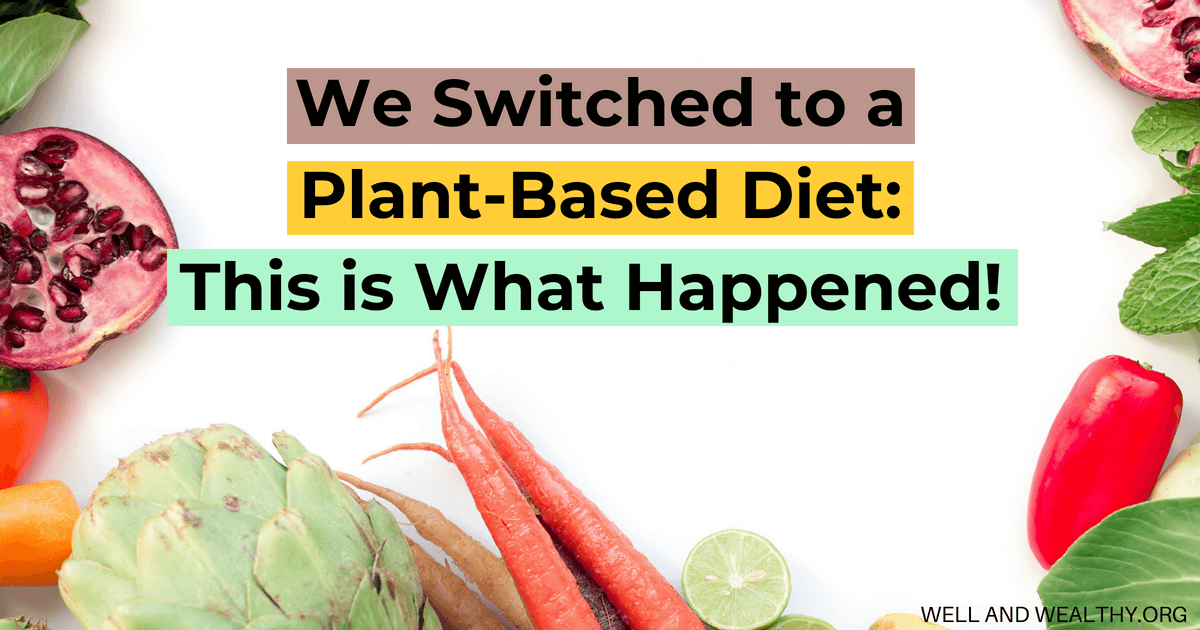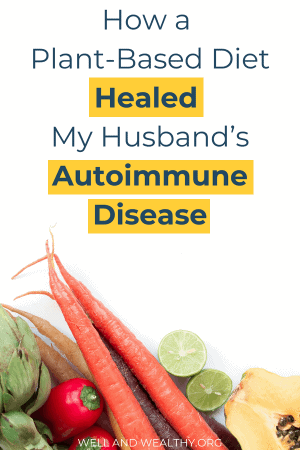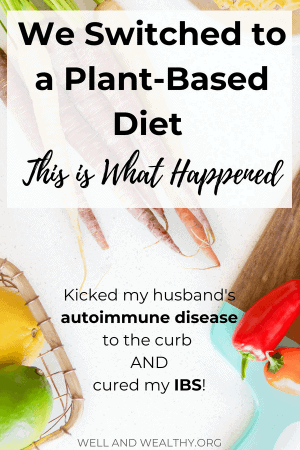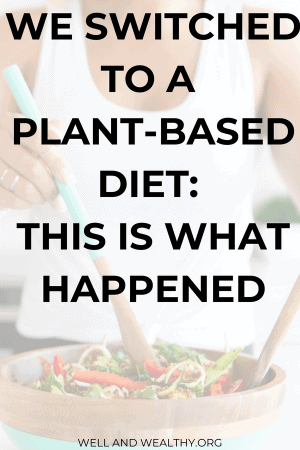We Switched To a Plant-Based Diet and This Is What Happened

Have you ever received some bad news that made you feel completely paralyzed, or like you were powerless to do anything about the situation?
That’s how I felt in the summer of 2015. I was a newlywed married to a strong, vibrant man, and I had just received the news that my husband had an incurable autoimmune disease.
It wasn’t a life-threatening diagnosis, but Josh’s disease would require a lifetime of medication and constant monitoring. It could also lead to mild complications such as anemia and more serious complications such as cancer.
Welcome to the world of ulcerative colitis.
As an affiliate partner of various brands and sponsored content, we may earn commission on qualifying purchases. Disclaimer | Advertise With Us
Disclaimer: I am not a healthcare professional. This is our personal experience, and your experience may be different than ours. You should do your own research before making any changes to your diet or lifestyle especially if you have a health condition.

Josh’s Inflammatory Bowel Disease
Ulcerative colitis is an autoimmune disease that causes the body to attack the colon. It’s in the same family as Crohn’s disease, but ulcerative colitis is localized to the large intestine.
When the disease flares up, it causes ulcers in the lining of the colon. Pain, blood loss, and lethargy all accompany those flares.
Initially, Josh was able to control his symptoms with a single daily dose of ulcerative colitis medication. However, within a few months, he had to double his original dosage plus take a steroid medication just to keep his flares under control.
Things weren’t looking so good! And as a new wife, it was hard for me to see him in that condition.
Even so, we trusted that his doctor knew best, and Josh continued taking that expensive medication.

My Irritable Bowel Syndrome
Long before we ever suspected that anything was wrong with Josh’s digestive tract, I had been battling my own war with irritable bowel syndrome.
My irritable bowel syndrome started in 2010. It took years to pinpoint my exact trigger foods, but eventually I figured out that I had a little-known food intolerance called fructose malabsorption.
Basically, my body could not process fructose, a naturally-occurring sugar found in fruit. This explained why I had severe gastrointestinal distress within 30 minutes of consuming soda, the first ingredient of which is usually high fructose corn syrup.
It also explained why foods naturally high in fructose (apples, grapes, watermelon, honey, bell peppers, sugar snap peas, etc.) sent me running for the restroom.
It was awful. I couldn’t eat anything without first reading the ingredient label, and I constantly feared accidentally eating something that would trigger my IBS.
Even with careful monitoring, I experienced horrible bouts of diarrhea on a weekly basis.
My IBS went on for six whole years before I finally found relief.
The Solution We So Desperately Needed
I can’t take credit for discovering the missing piece to our digestive puzzle. It was actually my mom who figured the whole thing out.
In the spring of 2016, after months and months of searching for a solution to Josh’s ulcerative colitis, she stumbled across some success stories of people who were able to cure their diseases just by changing what they eat.
That video guide taught us about the connection between food and disease and gave us hope that we could reverse our serious digestive issues. All we had to do was change what we eat.
Specifically, we needed to adopt a whole food, plant-based diet.
The Whole Food, Plant-based Diet Explained
If you’ve never heard of a whole food, plant-based diet, it can sound a bit intimidating. But I actually find that this way of eating is ultra-simple once you know the basic guidelines.
At its core, a whole food, plant-based diet consists of fruit, vegetables, whole grains, legumes, nuts, and seeds in their whole or minimally processed forms.
No counting calories or carbs, no fancy food pairing, and no worrying about getting more of a certain macronutrient than others.
Pretty easy, huh?
This lifestyle encourages eating an abundance of whole plant foods while avoiding animal products (meat, eggs, and dairy) and overly processed foods (bleached flour, enriched flour, white sugar, white rice, and just about all prepackaged foods you’d find in the grocery store).

What a Mostly Plant-based Diet Did for Our Health
I’ll be the first to disclose that we are not 100% plant-based.
We enjoy a good burger every now and then, and we eat the food that our family and friends lovingly prepare for us when they invite us over for dinner, animal products and all. However, we try to make good food decisions the majority of the time.
If I had to estimate, I’d say we eat plant-based about 85% of the time. With this dietary change, I’m happy to report that both of us won the battle over our digestive problems.
Within one month of going plant-based, my IBS was GONE! I can now eat all the apples and bell peppers I want without any negative consequences. It’s glorious!
Even more impressive is Josh’s health transformation.
Josh went plant-based in the summer of 2016, and by the summer of 2017, his ulcerative colitis flares were nonexistent. That fall, we started weaning him off of his medication to see if he was fully cured.
He completely stopped taking all of his ulcerative colitis medicine in October 2017, and he hasn’t had a single flare since!
As if our digestive improvements weren’t enough, we both saw additional health benefits after going plant-based.
My night terrors (these are different from nightmares) and mild anxiety went away, my dust and pet allergies are much less severe, my skin is vibrant, and I have more control over my emotions.
Josh lost fifteen pounds, doesn’t have eczema or sciatic nerve pain anymore, and has more energy to power through his gym sessions than ever before.
Suffice it to say, we’re both very happy with our health turnarounds. And all it took was changing the way we eat!
What a Whole Food, Plant-based Diet Can Do for You
While significant to us, our success story is quite typical of a whole food, plant-based diet. When I read this vegan food blog, I was blown away by the sheer quantity and diversity of the featured success stories.
And when I read The China Study, I saw even more success stories that boasted some pretty impressive health improvements.
Between the success stories in these two resources, many people have been able to reverse or significantly improve the following health problems:
- Heart disease
- Cancer (breast, prostate, bowel, melanoma, and others)
- Diabetes (reverse Type 2; significantly improve Type 1)
- Autoimmune diseases (ulcerative colitis, Hashimoto’s, multiple sclerosis, rheumatoid arthritis, scleroderma, and others)
- Irritable bowel syndrome
- Osteoporosis
- Erectile dysfunction
- High blood pressure
- High cholesterol
- Alzheimer’s
- Kidney stones
- Weight problems
- Depression
- Anxiety
- ADD/ADHD
- Low energy problems
- Sciatica
- Acne
- Migraines
While this list seems pretty long, it isn’t exhaustive.
If you suffer from one or more of these health problems, you may want to consider trying out a whole food, plant-based diet.
And if you have other health issues that aren’t on this list, it may be worth your while to find out if this way of eating can improve your particular condition.

How to Start a Whole Food, Plant-based Diet
If you think a whole food, plant-based diet may be right for you, then you’ll need some tips to help you navigate this new terrain.
Find Some New Recipes
Likely, your current recipe inventory deviates significantly from a whole food, plant-based diet.
Sometimes it can be hard to find new recipes that suit your family’s tastes, but you should use this time to experiment with a variety of new recipes, foods, and flavors. You may even discover some new favorites!
Some of my favorite plant-based recipe resources are Healthy French Wife, and Oh She Glows.
Remember to choose recipes that emphasize an abundance of plant foods in their whole or minimally processed forms. This means lots of fruit, vegetables, whole grains, legumes, nuts, and seeds.
Read, Read, Read!
The first thing you need to do is read up on the subject.
My all-time favorite resource is The China Study. That book tells you everything you need to know about the science behind a whole food, plant-based diet.
It will give you a solid foundation so you understand how and why a whole food, plant-based diet works so well, and it also offers some helpful transition tips to make the journey easier.
The founders of the Hallelujah Diet place a lot more emphasis on the raw aspect of eating plant foods, but the information is just as valuable.
Determine Your Why
Once you know what a whole food, plant-based diet can do for your health, really nail down your reasons for wanting to change the way you eat.
Is it so you can reverse or improve a certain health condition? Is it so you can improve your long-term health? Is it so you can avoid the heart disease that claimed every older woman in your family?
Having a compelling “why” will motivate you to stick with this lifestyle change even when times get tough.
Adjust Your Mindset
Whatever you do, don’t adopt an all-or-nothing mindset. There are some people who can change their eating habits overnight, but they are the exception, not the rule.
If you try to change your eating habits too quickly, you may get burned out and give up altogether.
Instead, remember that this is a journey, and allow yourself a little bit of grace. Try to make the best health decisions the majority of the time, and don’t obsess over the rest.
You’ll be much happier and much more likely to stick with this new lifestyle for the long haul if you approach it with a realistic attitude.
Get Picky at the Grocery Store
When you’re shopping at the grocery store, be very selective of the packaged and premade foods you buy. Don’t buy anything without reading the ingredient list first.
Choose foods that:
- Have a short ingredient list
- Contain real ingredients that you can pronounce
- Contain whole plant ingredients
Avoid and/or minimize foods that:
- Have a long ingredient list
- Contain unnatural ingredients that you can’t pronounce or that you don’t know what they are
- Contain animal products (meat, dairy, eggs, lard) and/or refined ingredients (enriched flour, bleached flour, sugar, canola oil, etc.)
Other Tips to Help You Go Plant-based
- Don’t let money deter you. We actually find that eating plant-based is a whole lot cheaper than eating a normal diet! That’s because animal products and premade foods are way more expensive than plant foods.
- Discount grocery stores such as Aldi and Lidl are your best friend. It’s much more affordable to eat whole plant foods when you buy them from discount grocery stores.
- Get your family involved with everything from learning about a whole food, plant-based diet to choosing new recipes to cooking plant-based meals. They’re much more likely to get on board when they feel included.
- Cook most of your meals yourself. You can control the ingredients AND save money when you cook at home.
- Take one 5000 mcg sublingual (dissolves under the tongue) vitamin B12 supplement every few days to make sure you get this important brain vitamin. You’ll get all the other vitamins and minerals you need from your food. And yes, you’ll even get plenty of protein just by eating a variety of whole plant foods!
Wrapping It Up
To make a long story short, what we put into our bodies has a huge impact on our health. Plenty of scientific evidence and personal success stories indicate that the best food to eat for long-term health is plants.
Specifically, fruit, vegetables, whole grains, legumes, nuts, and seeds in their whole or minimally processed forms are what we should eat an abundance of.
I want you to know that going plant-based was the best decision Josh and I ever made. We healed some pretty serious health problems, took control of our long-term health, and opened ourselves up to a whole new world of flavorful recipes.
At ages 31 and 25 respectively, Josh and I feel better now than we ever have before.
Josh and I are proud to be a success story, but my hope is that YOU become a success story too.
No matter what you’ve been told before, you have the power to significantly improve your long-term health. All you have to do is change what you eat.
So what are you waiting for? It’s time to dive right in, take back your health, and never look back!
This post was a guest post from Summer, a homemaker, personal finance nerd, healthy lifestyle enthusiast, and blogger over at Simplify This Home.
She equips women with the information, tools, and resources they need to streamline their homemaking routines, manage their finances, and improve their long-term health so they can live life to the fullest.
So don’t give up, keep trying and eventually you will hit on the lifestyle that puts you in your healthiest state! And give plant-based a try, it could be what works for you!








